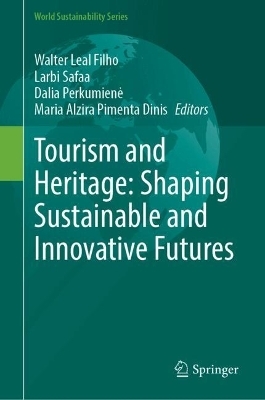
Tourism and Heritage: Shaping Sustainable and Innovative Futures
Springer International Publishing (Verlag)
978-3-031-81484-6 (ISBN)
- Noch nicht erschienen - erscheint am 09.03.2025
- Versandkostenfrei innerhalb Deutschlands
- Auch auf Rechnung
- Verfügbarkeit in der Filiale vor Ort prüfen
- Artikel merken
This book brings together multidisciplinary contributions from various academic and professional backgrounds, addressing the challenges and opportunities of sustainable tourism. It focuses on diverse themes such as the management of intangible cultural heritage, responsible practices in the tourism sector, and technological innovations, including artificial intelligence. This book provides a comprehensive view of the sector through a variety of perspectives, taking into account environmental, social, economic, and legal aspects. This diversity allows for the exploration of complex issues such as the sustainable management of natural resources, the protection of tourists' personal data in a digital context, and partnerships between tourism actors and local communities for the preservation of cultural heritage. One key issue explored is the growing role of technology, including reflections on the use of artificial intelligence in combating tourism-related cybercrime. The contributions come from authors affiliated with a wide range of institutions, representing internationally renowned organizations from regions as diverse as Europe (Belgium, Lithuania, Latvia, Hungary, France, Italy, Portugal, Spain), as well as Turkey, Africa (Morocco), and Asia (China). This geographic and institutional diversity enriches the discussion on sustainable practices and innovations in the tourism sector, integrating both local and global perspectives. The accessibility of public spaces and leisure services for tourists, as well as market segmentation, are also discussed. This book stands out for its interdisciplinary approach, combining theory and practice to provide researchers, tourism professionals, policymakers, and heritage managers with innovative tools and strategies. It offers concrete and ethical solutions for the development of sustainable tourism that respects the cultural and natural values of territories, while addressing contemporary demands for social and environmental responsibility.
Sustainable Management of Intangible Cultural Heritage - Tourism Partnership: Suggesting an Approach to Improving Contribution and Assessing Performance.- A Comprehensive Insight into Religious Tourism Research Trends with Case Studies from Spain and Saudi Arabia: Constructing a Co-Word Network Using the Leiden Clustering Algorithm and a Thematic Map.- An Examination of Visitors' Experiential Learning from North African Ethnic Exhibits in Moroccan Museums Using Large Language Model-Based Artificial Intelligence: A Case Study of Berber Cultural Heritage.- Experiential Tourism: A Conceptual and Functional Analysis.- Tourism Experience Unfolded: Three Decades of Scholarly Insights and Evolutionary Trends (1996-2024).- Socially Responsible Behaviour of Tourism Businesses in the Provision of Accommodation Services.- Social Responsibility in Tourism: Case of Air Transport Services.- Animal Rights as a Perception of Social Responsibility in Tourism and Recreational Activities.- Challenges of Ensuring the Implementation of Consumers' Right to Information in the EU Tourism Services Market.- The Responsibility Arising from the Contracts of Tourists Carriage by Air Transport. Analysis of the Spanish Legislation and Jurisprudence.- Ecotourism as an Expression of a Person's Right to a Clean and Safe Environment.- The Ways to Promote Sustainable Tourism in the City of Vilnius as the Name of the European Green Capital.- Promoting of the Sustainable Tourism in Ilzenberg Manor. Case Study of Lithuania.- Society's Relationship with the Forest and Forest Recreation and Tourism Trends.- Territorial Marketing and Regional Development: Optimizing the Touristic Attractiveness of Drâa Tafilalet Region.- Possibilities and Smart Solutions for the Accessibility of Events for Tourists with Mobility Disabilities.- The Role of Artificial Intelligence in Cybercrime in the Tourism Sector.- Legal Issues of Personal Data Protection in the Electronic Space Related to Tourists' Data.- Management of Modern Organisations in the Context of Lithuanian Smart Tourism.- Identifying of Influencer Rights and Legitimate Interests: A User Narrative of a Smart Tourism Organization.- Mapping of Tourism E-Reputation: Characterization of a Decade and a Half of Literature.- Segmentation of the Leisure Services Market for the Improvement of the Implementation of Tourists' Needs: The Case of the Lithuanian Recreation Park.- Accessibility of Urban Park as a Public Space for a Tourists 'Leisure Time.- Financial Determinants of Firm Survival in the Belgian Tourism Sector: Insights for Sustainable and Resilient Futures.- The Impact of COVID -19 On The Financial Health of Lithuanian Tourism Sector.- Laziness-work Balance: Perceived Leisure and Tourism Support.- Authenticity, A Seminal Concept in Tourism Research: What Does A Relational Bibliometrics Say?.
| Erscheint lt. Verlag | 2.5.2025 |
|---|---|
| Reihe/Serie | World Sustainability Series |
| Zusatzinfo | Approx. 460 p. 45 illus., 15 illus. in color. |
| Verlagsort | Cham |
| Sprache | englisch |
| Maße | 155 x 235 mm |
| Themenwelt | Naturwissenschaften ► Biologie ► Ökologie / Naturschutz |
| Naturwissenschaften ► Geowissenschaften | |
| Schlagworte | Culture • Destination • Heritage • Innovation • sustainability • Tourism |
| ISBN-10 | 3-031-81484-3 / 3031814843 |
| ISBN-13 | 978-3-031-81484-6 / 9783031814846 |
| Zustand | Neuware |
| Haben Sie eine Frage zum Produkt? |
aus dem Bereich


